Evelyn Underhill’s Challenge to the Contemporary Church: Lessons from Her Letters of Spiritual Direction on the Nature of the Church and the Reforming Centrality of Prayer
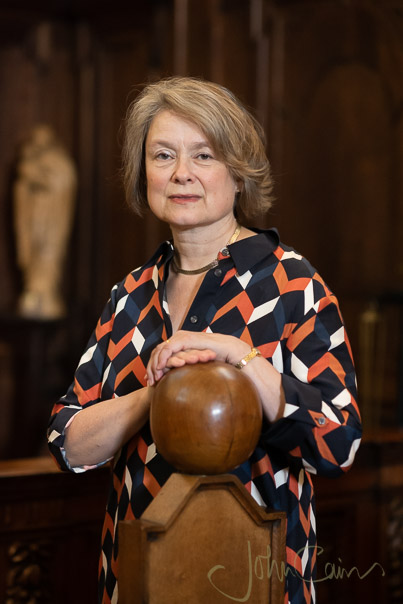
Led by theologian Sarah Coakley
Saturday, June 17, 2023, 9:30am – 3:30pm
Nourse Hall, St. Albans Episcopal Church
3001 Wisconsin Ave. N.W., Washington DC 20016
Please bring a sack lunch
Registration begins May 1, 2023
Download Registration Form
Those new to Underhill’s Letters (edited shortly after her death in 1941 by the writer and spiritual director, Charles Williams, and reissued, 2008) may initially be struck by the constraints of their locatedness in British upper-middle-class life of the first part of the 20th century. But although Underhill was very much an Edwardian lady, she was also a writer, reformer, and theological guide of lasting significance, whose wisdom is as sharply relevant to the contemporary crises of the Church now as it was then. Drawing primarily from The Letters of Evelyn Underhill, the retreat addresses will focus especially on how Underhill applied what she herself learned from her two beloved Roman Catholic spiritual advisors (‘My Baron’, Friedrich von Hügel, and ‘My Abbot’, Dom John Chapman, OSB) to those under her own direction in the Church of England, and how her particular wit and insight should still discomfort, challenge and–above all–inspire us today.
Sarah Coakley is a theologian, philosopher of religion, and Anglican priest whose writing is centrally concerned with the relation between contemplation and theological expression. Educated at Cambridge and Harvard Universities, she has taught during her academic career at the Universities of Lancaster, Oxford, Harvard, and Cambridge, and has assisted as a priest in parishes in both the UK and the US. She now lives in semi-retirement in Alexandria, Virginia, and is completing the writing of her systematic theology, the first volume of which was published as God, Sexuality, and the Trinity (Cambridge University Press, 2013). Other relevant publications include Powers and Submissions: Philosophy, Spirituality, and Gender (Blackwell, 2002), and The New Asceticism: Sexuality, Gender, and the Quest for God (Bloomsbury, 2015).
In This Newsletter
Encounters with Evelyn Underhill
By Esther Moir de Waal
New and Noteworthy
In Memoriam
Encounters with Evelyn Underhill
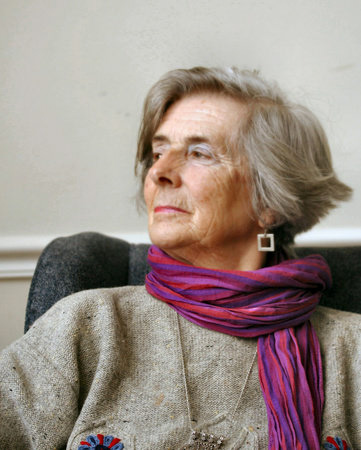
Esther Moir de Waal is a foremost scholar in the Benedictine and Celtic traditions and a beloved spiritual writer who pioneered the application of monastic spirituality to everyday life. A historian trained at Cambridge University and the mother of four adult sons, she has lectured and offered retreats in her native United Kingdom and globally. She is the author of many articles and eight books on spiritual life. The Evelyn Underhill Association is grateful she agreed to a brief interview with Dana Geene, president emerita of the EUA, on her memories of reading Underhill, her recollections of the sense of place she associates with Underhill, and the importance of Evelyn Underhill in her own world–and ours.
My first encounter with Evelyn Underhill was by way of Pleshey, and I remember it vividly. I was a graduate student in history living in London, and I went for my first retreat. It was the start of Lent, February 1957, and it was cold, bitterly cold, with of course no such thing as central heating. I was frozen but felt that the colder I became the holier I must be! I was reading Underhill’s Abba: Meditations on the Lord’s Prayer and loving it. It brought something familiar vividly to life, and I felt as though I had discovered something which added a new dimension to my belief.
My next encounter was again associated with place. By then I was living in Canterbury, and in the cathedral there was a chapel up a flight of stairs, generally kept locked.This was All Saints Chapel, and it has Evelyn Underhill’s crucifix on the wall. Here a small group met regularly for meditation under the guidance of Miss Agatha Norman, who had been a friend of Underhill. She instructed each new member of the group in how to present material and to reflect fully and prayerfully on it, just as she herself had received and reflected on it.This is how I learned to
present material, not in lecture style or for a symposium, but quietly and reflectively–a gift for which I have been supremely grateful.
This, then, was the incentive to pick up more of Underhill’s writings, and what I chose were her letters. They did not seem to be either too Edwardian or too stilted. I knew Campden Hill Square [where Underhill lived in London from 1907 to 1939] because of friends living there, and, again, a sense of place came into play, for I could vividly imagine Underhill there. I also loved the wide range of her correspondents and subject matter.
I found myself drawn into the general subject of mysticism, and I look upon that as Underhill’s final gift to me. Subsequently, my reading centered around the monastic tradition, where I discovered a glorious balance between Evelyn Underhill, mysticism, and monastic wisdom.
New and Noteworthy
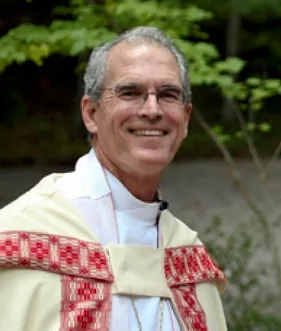
On June 11, 2022, for the first time since 2019, the EUA held its Annual Quiet Day in person on the grounds of the Washington National Cathedral. The leader was Bishop Porter Taylor, who served as the sixth bishop of the Episcopal Diocese of Western North Carolina. In retirement he joined the faculty of Wake Forest University Divinity School as Visiting Professor for Episcopal Studies. He has a PhD in theology and literature from Emory University. His presentation was entitled “Receivers and Transmitters: Our Role in God’s Saving Work in the World.”
Bishop Taylor also led a retreat in June on Underhill and practical mysticism for the Maryland and Washington DC chapter of Contemplative Outreach. It is available for purchase from their online video library. In May, he spoke on “Evelyn Underhill: What is Mysticism?” af the Center for Spiritual Deeping at St. Aidan’s Church in Alexandria, Virginia.
The Winter 2021 Scottish Episcopal Institute Journal devoted a section of the issue to the life and work of Lucy Menzies, Scottish scholar and devoted friend and disciple of Evelyn Underhill. The six articles were curated by Ann Loades, emerita professor of divinity at the University of Durham and honorary professor in the school of divinity at the University of St. Andrews in Scotland, and they include pieces by Jane Shaw on the early 20th century revival of mysticism and Robyn Wrigly-Carr on Underhill’s spiritual nurture of Menzies.
The Fall 2022 online courses of the Center for Anglican Learning and Leadership, offered by Church Divinity School of the Pacific, included one on Anglican identity, taught by the Rev. Daniel London, The class featured practicing spiritual disciplines in the Anglican tradition and “practicing contemplation with Evelyn Underhill.”
Robyn Wrigley-Carr, an associate professor in theology and spirituality in Australia and editor of Evelyn Underhill’s Prayer Book, published “Life Lessons We Need Right Now” in the March 9, 2022 issue of Eternity magazine. Her piece was written to share some of the lessons she has learned from the life and writings of Evelyn Underhill and to celebrate Underhill’s legacy for International Women’s Day. Read an excerpt:
In 1940, during World War II, Evelyn Underhill wrote that it’s when “everything is reeling” that we truly start to perceive God’s “overruling presence,” his “Majesty and Mercy”. She argued that when our earthly situation is “deteriorating” and the temporal outlook looks darkest, the “great swings back of the human spirit towards the Eternal have taken place.”
Perhaps our current crises–the global pandemic, war in Ukraine, the Australian floods, and our climate emergency–provide an opportunity for a unified, renewed fervor in prayer; a new hope, urgency, and unity as lovers of Christ, as together we participate in the hastening of God’s Kingdom, through prayer and action. Underhill encourages us to pray for the renewal of the Holy Spirit in ourselves and in the whole Church, to “‘kindle our cold hearts and light up our dark minds’, showing us God’s will for the future and enabling us to do our part.” These words hold deep resonance for us today as we navigate these fragile times.
An excerpt from Underhill’s book Practical Mysticism (1915) has appeared in the book Women on Nature (Unbound, 2021), edited by Katharine Norbury. An anthology of more than 100 women writers on place, landscape, and the natural world, the collection ranges from Monica Ali to Dorothy Wordsworth. Read an excerpt from the Underhill selection:
We should receive from every flower not merely a beautiful image to which the label ‘flower’ has been affixed, but the full impact of its unimaginable beauty and wonder, the direct sensation of life having communion with life: that the scents of ceasing rain, the voice of trees, the deep softness of the kitten’s fur, the acrid touch of sorrel on the tongue should be in themselves profound, complete, and simple experiences, calling forth simplicity of response in our souls.
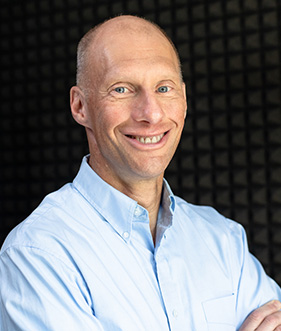
After spending most of the last 30 years in the academic world, teaching worship and theology most recently at Fuller Theological Seminary in Pasadena, California, Todd E. Johnson, who spoke at a past EU Quiet Day in Washington and who has written extensively about Underhill on the EUA website and elsewhere, is now senior pastor at First Covenant Church in Seattle. A longtime associate member of The Order of Julian of Norwich, Johnson gave a talk and wrote a paper for Julianfest in 1993 on mysticism and liturgy in the thought of Evelyn Underhill, published by the Julian Papers. It is still available for purchase from the Order in booklet form for $3.00. Read an excerpt from it here that relies on Underhill’s 1927 paper, “Sacraments and Mysticism,” delivered at a conference on the Eucharist sponsored by the Society of Saints Peter and Paul, a group in the Anglican Communion with very strong Catholic leanings, and published in Report of the Anglo-Catholic Congress:
It is the mystic who realizes that God’s presence is not antithetical to the physical world, but because the mystics have a finely tuned sense of the supernatural they are able to more fully appropriate the presence of God in the sacraments. The sacraments provide an objective base, a guard against rampant subjectivism. Underhll criticizes those groups who have rejected symbols, sacraments, and ceremonies in search of “pure spirituality,” concluding that they result in narrowness and sectarianism. The solution Unnderhill offers is a necessary balance between the internal and the external, the mystical and sacramental. Mysticism and prayer are testimonies to divine immanence; sacraments are testimonies to divine transcendence. God is present neither in the sacraments nor in some “abnormal state of consciousness” alone, but in both. Refusal to acknowledge both leads to “bad mysticism and bad religion.” In a crucial point in her argument, Underhill turns to analogy to support her position. If one wishes to feed a plant, she writes, one would not uproot it and shake off the soil until it is pure plant, for its life depends on the soil as a means of accessing nourishment. So, too, human life is rooted in physicality; God’s spirit is necessarily available through the stuff of human life in which we are planted. The spiritual life is inseparable from natural life, for the goal of the spiritual life is the infusion of the Spirit, which purifies and transfigures our natural lives…
[Underhill’s] perspective results in a balanced understanding of prayer, corporate and private, and a fuller comprehension of God, immanent and transcendent. Her understanding of the centrality of the Spirit allows one to see the mystical and liturgical as the interdependent realities they are.
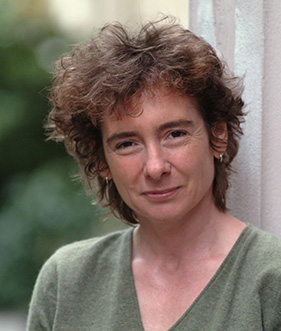
On May 24, 2022, the acclaimed writer Jeannette Winterson’s lecture on “The Life of the Spirit and the Life of Today” marked the centennial of the Upton Lecture in Religion and Philosophy at the University of Oxford’s School of Theology. Evelyn Underhill spoke on the same theme when she delivered the inaugural Upton Lecture in 1922. The 100th anniversary event this year was held at Oxford’s Harris Manchester College and hosted by Jane Shaw, Principal of Harris Manchester College.
Dana Greene’s article on “Evelyn Underhill and the Franciscan Tradition” appeared in Renascence, LXXXIV, No 2, Spring 2022, a critical and scholarly journal published by Marquette University.
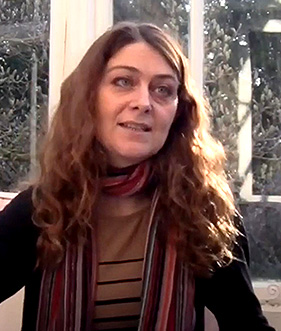
The Rev. Edd Stock, currently Chaplain of Walsall Healthcare NHS Trust (Lichfield), interviewed Dr. Louise Nelstrop, Junior Research Fellow in the Faculty of Theology and Religion at Oxford and a specialist in English mystics, about Evelyn Underhill. Their conversation is still available on YouTube.
Dr. Nelstrop is also Director of Studies at the Margaret Beaufort Institute of Theology at Cambridge, where she oversees the MA degree in Christian Spirituality East and West.
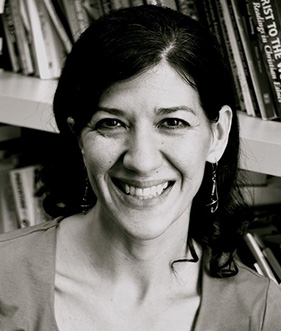
The 21st annual Underhill Lecture in Christian Spirituality at Boston College was delivered on July 9, 2022, by Julie Hanlon Rubio, Professor of Christian Social Ethics at Santa Clara University and author of Hope for Common Ground: Mediating the Personal and the Political in a Polarized Church (Georgetown University Press, 2016),. The book explores how practical mysticism can help Christians heal divisions in the church and cultivate a better politics. The Boston College Institute of Religious Education and Pastoral Ministry first established the summer Underhill Lecture in 2001. The lecture series continues under the sponsorship of BC’s School of Theology and Ministry.
On November 2, 2021, Robyn Wrigley-Carr delivered online the 2021 Liddon Lecture, sponsored by the Society of the Faith, on “Evelyn Underhill: A Spiritual Ecumenist.”
She was also interviewed on April 4, 2022 about Underhill and her prayer book on the podcast of Renovare, a nonprofit Christian publisher.
Robin Wrigley Carr also published “Darkness and Light in Evelyn Underhill” in the Journal of Spiritual Formation and Soul Care, Volume 12, Issue 1, published by Biola University
“Evelyn Underhill and the God Who Comes to Us Secretly” was written by Br. Curtis Almquist, SSJE, on June 15, 2022 for Underhill’s feast day. It appeared on the Society of St. John the Evangelist’s website.
It is still possible to watch “Praying with Evelyn Underhill Parts One and Two.” The videos were sponsored by the Diocese of Chelmsford and are set at the Pleshey Retreat House, located in the diocese.
In Memoriam
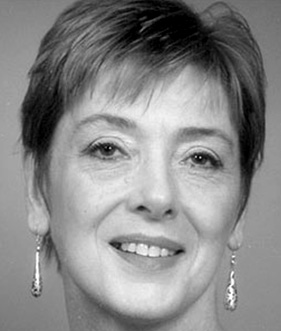
Ann Loades, born 1938 in the UK, emerita professor of divinity at Durham University and honorary professor at St. Andrew’s Divinity School in Scotland, died in early December 2022. A prolific author, lecturer, preacher, writer of scholarly articles and and reviewer of books, she was known for her work on Evelyn Underhill and on feminism and theology. Her last books included Grace is Not Faceless: Reflections on Mary and The Serendipity of Life’s Encounters. In 2008, she was honored by a festschrift, Exchanges of Grace, edited by Natalie K. Watson and Stephen Burns. She was the first women to be awarded a CBE for services to theology, the first woman president of the Society for the Study of Theology, and the first woman to receive a personal chair at Durham University and to take a seat in the Chapter of Durham University.
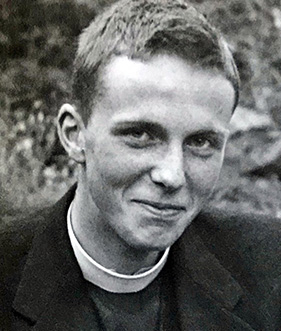
The Revd Dr. Christopher J.R. Armstrong, author of Evelyn Underhill: An Introduction to Her Life and Writings (Eerdmans, 1976), the second published biography of Underhill, died July 9, 2021 at age 86. His obituary appeared in Church Times on October 8, 2021. He entered Downside Abbey as a boy, was ordained a priest at 24, and completed a doctoral degree at Cambridge. Eventually, he married and joined the Church of England. Read the rector’s sermon at his funeral at the Priory Church at Bolton Abbey, which quoted Underhill: “It seems so much easier in these days to live morally than to live beautifully. Lots of us manage to exist for years without ever sinning against society, but we sin against loveliness every hour of the day.”
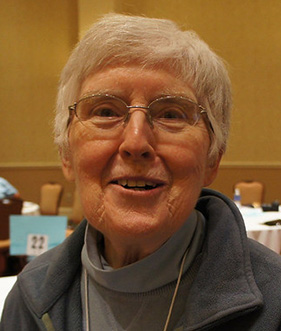
Sister Annice Callahan RSCJ, a Religious in the Society of the Sacred Heart, died on August 19, 2019, aged 74. She earned a PhD in systematic theology at Boston College in 1984 and taught at BC, Sacred Heart Seminary, Regis College in Toronto, and the University of San Diego. She wrote four books, including Spiritual Guides for Today (Crossroad, 1991) and Evelyn Underhill: Spirituality for Daily Living (University Press of America, 1997).